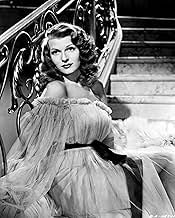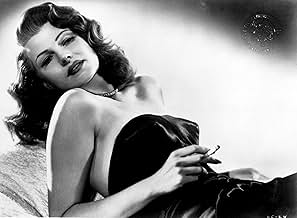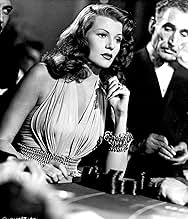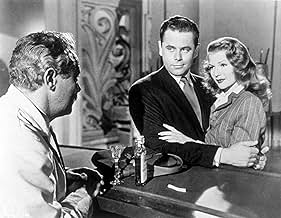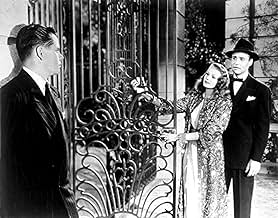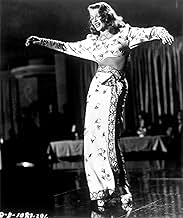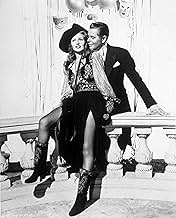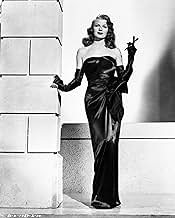Un giocatore d'azzardo, da poco assunto per lavorare in un casinò di Buenos Aires, scopre che la nuova moglie del suo capo è la sua ex amante.Un giocatore d'azzardo, da poco assunto per lavorare in un casinò di Buenos Aires, scopre che la nuova moglie del suo capo è la sua ex amante.Un giocatore d'azzardo, da poco assunto per lavorare in un casinò di Buenos Aires, scopre che la nuova moglie del suo capo è la sua ex amante.
- Regia
- Sceneggiatura
- Star
- Premi
- 4 vittorie e 1 candidatura in totale
- Gabe Evans
- (as Robert Scott)
- Thomas Langford
- (as Don Douglas)
- Newsman
- (non citato nei titoli originali)
- …
- Gambler
- (non citato nei titoli originali)
- Nightclub Patron
- (non citato nei titoli originali)
- Blackjack Dealer
- (non citato nei titoli originali)
- Girl at Carnival
- (non citato nei titoli originali)
- Gambler
- (non citato nei titoli originali)
- American Cartel Member
- (non citato nei titoli originali)
Recensioni in evidenza
"Gilda" is the film that made Rita Hayworth a star, and (with "Paths of Glory") gave Macready his justifiable claims to being one of Hollywood's best villains. Ironically many people don't think of Macready as anything but a villain in movies. It is true that in films like "Lady Without a Passport" and "The Big Clock" he was a villain, but he also could play decent people. He tries to help Spencer Tracy escape recapture and execution in "The Seventh Cross", and he is the wise minister and reformer who helps thwart Ray Milland (a.k.a. the Devil) in "Alias Nick Beal". But his Balin is pure, malevolent ice. There has been some suggestion that Balin's relationship with Johnny is actually a homosexual one (the business with the knife in the cane possibly being a metaphor for a male sex organ). Perhaps, but it is a weird friendship of two cynics who (briefly) enjoy each other's cynicism.
Curiously enough the business of the tungsten cartel is rarely discussed in going over the film. Like "Notorious" which came out about the same time, "Gilda" reminded American audiences of the large numbers of Nazis and collaborators who fled to South America in this period. In "Notorious" it was Brazil, and the gang (led by Alex Sebastian - Claude Rains) was fooling around with uranium. Here the idea of such people controlling a useful metal's manufacturing was not probed as much, probably because Balin was set to double cross them. But it is worrying to think of them coming so close to it.
In a discussion of the Warner Baxter film, "Such Men Are Dangerous" I mentioned that (like that film) there is a hint here of the 1928 mysterious death of millionaire Alfred Loewenstein, who managed to fall out of his private airplane over the English Channel. Here, to evade both the Nazis and Calleia, Balin arranges his plane to explode over the ocean (although the audience and Calleia see a figure parachute before it does so). Not quite the same problem as the Loewenstein mystery, but one can see the seed of the idea was there.
I would say this was certainly one of the better film noirs. It even was somewhat thought provoking.
Hayworth may either be the intruding wedge that comes between Glenn Ford and George Macready or the object of both men's romantic interests. From the initial meeting between Ford as two-bit gambler Johnny Farrell and Macready as Ballin Mundson the casino owner, an ambiguous, possibly homo-erotic, attraction is established between the two men. The lingering looks that they exchange can be read in several ways, but Bogie never looked into Cagney's eyes like Ford looks into Macready's. After Ford begins to work for Macready, his devoted care and slavish attention to his boss's needs exceed the bounds of employee and employer. When Hayworth moves into Macready's home as his new wife, Ford returns the key to the house as though he were a jilted lover. Ford's increasing jealousy becomes apparent after Hayworth's arrival on the scene, but it is unclear of whom he is jealous, Hayworth or Macready or possibly both. Perhaps Ford's character is as unsure of his own feelings as is the viewer, which makes the ambiguity even more intriguing. Macready's jealousy also grows as the heat between Ford and Hayworth intensifies, but, again, it is ambiguous of whom he is jealous.
With a dazzling performance by Hayworth, excellent black-and-white photography by Rudoph Mate, fine direction by Charles Vidor, and layers of psychological possibilities to ponder, "Gilda" is as golden as its title suggests.
Hayworth is gorgeous and so is Ford. They are so good together and in this movie they are positively great. When great screen lovers are mentioned, I've often wondered why Ford and Hayworth aren't among them.
This is one of my absolute favorites.
By the way, it is rather fascinating to see that in many ways this film mirrored the real-life antics of Rita--especially in regard to how she had a devil of a time picking men! Both Gilda and Rita both seemed to have a lot of sex destructiveness within them.
Do you remember in Cabaret how both the Liza Minnelli and Michael York characters find out they are sex partners to the same German bi-sexual man? That's essentially what happens in Gilda though with the Code firmly in place it's not something we talk about. George MacReady, a man of many interests rescues Glenn Ford from the docks of Buenos Aires after he's won some money from sailors in a crap game. They hit it off and Ford becomes his right hand man in running the casino MacReady operates.
Then MacReady brings home a wife and lo and behold it turns out to be an old girl friend of Ford's, Rita Hayworth. Add to that some Nazi refugees have some business with MacReady over some tungsten mines.
The real emphasis in this film is sex and personified by the best embodiment of sex ever on the silver screen. This film raked in a lot of dollars for Harry Cohn and Columbia Pictures. Hayworth, voice dubbed as usual, had a big number here in Put the Blame on Mame. It became a signature tune for her the rest of her life.
One thing did disappoint me about Gilda. For a story that took place in Buenos Aires who many say is the most beautiful city in the world, it would have been nice to see some location shots, even if it was just some newsreels to establish the time and place. The film might as well have been in Albuquerque.
But when you've got Rita to look at, it could be at the South Pole.
Lo sapevi?
- QuizThere is a rumour that this film is the only time Rita Hayworth's real singing voice is heard, but that is not true. According to the bonus features from the DVD, Hayworth actually never recorded her own singing voice and was a talented lip-syncher. Anita Ellis dubbed almost all of her singing in this film. Hayworth always wanted to do her own singing, and Columbia Pictures chief Harry Cohn paid for her voice lessons, but she never developed a voice he considered strong enough to be used; Hayworth remained bitter about that for the rest of her life.
- BlooperWhen Farrell asks to cut the deck at the blackjack table, he shuffles the deck prior to the cut; this is not allowed.
- Citazioni
Gilda: You do hate me, don't you, Johnny?
Johnny Farrell: I don't think you have any idea of how much.
Gilda: Hate is a very exciting emotion. Haven't you noticed? Very exciting. I hate you too, Johnny. I hate you so much I think I'm going to die from it. Darling...
[they kiss passionately]
Gilda: I think I'm going to die from it.
- ConnessioniEdited into Sogni perduti (1968)
I più visti
- How long is Gilda?Powered by Alexa
Dettagli
Botteghino
- Lordo in tutto il mondo
- 5999 USD
- Tempo di esecuzione1 ora 50 minuti
- Colore
- Proporzioni
- 1.37 : 1
Contribuisci a questa pagina



